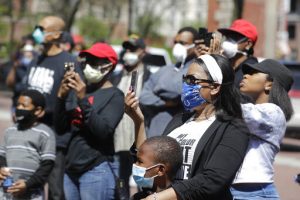A clear line of violence and antisemitism connects the dots of Trump’s presidency. This is the single most important thing he will go down in history for.
President Donald Trump was silent for several long hours while violent thugs marched from his rally in front of the White House to the U.S. Capitol and stormed the halls of Congress, threatening the safety of lawmakers and police officers, firing shots inside the most sacred corridors of American democracy, and forcing a halt in the process of certifying Joe Biden’s Electoral College victory.
When he finally released a video statement, hours into the siege on Congress, it was a short, scripted message in which he repeated his lies about an election that was supposedly “stolen” from him, and politely asked the mob to “go home in peace.”
pic.twitter.com/Pm2PKV0Fp3— Donald J. Trump (@realDonaldTrump) January 6, 2021
If by chance some reporter would have somehow succeeded in placing a microphone in front of Trump during those long hours of silence, we can easily assume what the outgoing president would have said. “You had some very bad people in that group,” Trump would say, referring to his extremist supporters who marched with Confederate flags into the Senate. “But you also had people that were very fine people. On both sides.”
Trump has had many failures, and also some successes, during his four years as president. But his legacy will eventually come to be defined by two events, one that happened early on during his first year in office, and one that happened just now, two weeks before the end of his presidency.
The first event that will forever be associated with Trump is the violent far-right gathering in Charlottesville, Virginia, in the summer of 2017, which caused Trump to make the infamous “very fine people on both sides” comment. That event made him the first, and hopefully last, American president to legitimize and praise neo-Nazis who terrorized the citizens of an American city.

The second event is what happened on Wednesday, when his most brainwashed and conspiratorial supporters tried – and for a short while succeeded – to forcefully stop a debate in Congress over the results of the presidential election.
Trump didn’t just inspire this attack on Congress by sharing, day-after-day for the past two months, false conspiracy theories about the election. He literally told his supporters, who gathered for a demonstration outside the White House earlier on Wednesday, that they need to march on Congress.
Not coincidentally, they broke into the building at the same time that the U.S. media unveiled a letter by Vice President Mike Pence, in which he rejected Trump’s unlawful demand of him to throw away valid Electoral College votes that were cast for Biden.
Trump’s supporters realized that he had lost his final legal avenue for overturning the election results, and they shifted to illegal action. Trump didn’t denounce them for it; instead, he told them “we love you” and blamed the violence on “the other side,” which now includes not just Biden and the Democratic party, but also Republican governors, election officials, senators and members of congress who refused to participate in his attack on democracy.

The rallying cry of the far-right event in Charlottesville was “Jews will not replace us,” and three years later, it is still a message that thrives beneath the surface of Trump’s cult-like movement. Just hours before Trump’s thugs broke into the Capitol, Georgia had elected its first-ever Jewish Senator, clearing the way for the election of America’s first-ever Jewish Senate majority leader, all on the same day that Biden announced his intention to appoint a prominent Jewish judge, Merrick Garland, to be his attorney general.
For those who speak in antisemitic terms such as “globalists” and spread insane conspiracy theories that include antisemitic elements, there will be no compromises as they fight to preserve their man in power. When they say that Jews will not replace them, they mean it – literally. And they know that in his heart, Donald Trump is with them, no matter how many times his Jewish relatives will claim otherwise.
A clear line of violence and antisemitism stretches from Charlottesville to the Capitol, from August 2017 to January 2021. This line is the single most important thing that history will record about Donald Trump’s presidency.




